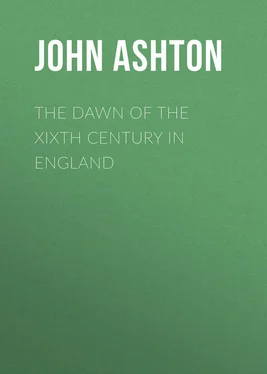John Ashton - The Dawn of the XIXth Century in England
Здесь есть возможность читать онлайн «John Ashton - The Dawn of the XIXth Century in England» — ознакомительный отрывок электронной книги совершенно бесплатно, а после прочтения отрывка купить полную версию. В некоторых случаях можно слушать аудио, скачать через торрент в формате fb2 и присутствует краткое содержание. Жанр: foreign_antique, foreign_prose, на английском языке. Описание произведения, (предисловие) а так же отзывы посетителей доступны на портале библиотеки ЛибКат.
- Название:The Dawn of the XIXth Century in England
- Автор:
- Жанр:
- Год:неизвестен
- ISBN:нет данных
- Рейтинг книги:3 / 5. Голосов: 1
-
Избранное:Добавить в избранное
- Отзывы:
-
Ваша оценка:
- 60
- 1
- 2
- 3
- 4
- 5
The Dawn of the XIXth Century in England: краткое содержание, описание и аннотация
Предлагаем к чтению аннотацию, описание, краткое содержание или предисловие (зависит от того, что написал сам автор книги «The Dawn of the XIXth Century in England»). Если вы не нашли необходимую информацию о книге — напишите в комментариях, мы постараемся отыскать её.
The Dawn of the XIXth Century in England — читать онлайн ознакомительный отрывок
Ниже представлен текст книги, разбитый по страницам. Система сохранения места последней прочитанной страницы, позволяет с удобством читать онлайн бесплатно книгу «The Dawn of the XIXth Century in England», без необходимости каждый раз заново искать на чём Вы остановились. Поставьте закладку, и сможете в любой момент перейти на страницу, на которой закончили чтение.
Интервал:
Закладка:
“Shall, Frenchmen rule o’er us? King Edward said, No!
And No! said King Harry, and Queen Bess she said, No!
And No! said Old England, and No! she says still;
They never shall rule Us; let them try if they will.
Hearts of Oak we are all, both our Ships and our Men;
Then steady, Boys, steady,
Let’s always be ready;
We have trimmed them before, let us trim them again.
Shall Frenchmen rule o’er us? King George he says No!
And No! say our Lords, and our Commons they say No!
And No! say All Britons of every degree;
They shall never rule Britons, United and Free.
Shall Frenchmen rule us, the Free Sons of the Waves?
Shall England be ruled by a Nation of Slaves?
Shall the Corsican Tyrant, who bound on their Chains,
Govern Us, in the room of Our Good King who reigns?
Though He’d fain stop our Press, yet we’ll publish his shame;
We’ll proclaim to the World his detestable Fame;
How the Traitor Renounced his Redeemer, and then
How he murder’d his Pris’ners and Poison’d his Men.
Then Down with the Tyrant, and Down with his Rod!
Let us stand by our Freedom, our King, and our God!
Let us stand by our Children, our Wives, and our Homes!
Then Woe to the Tyrant Whenever he Comes!
The following is particularly good, as it gives a very vivid description of what might have occurred, had Napoleon’s threatened invasion been successful, and it will favourably contrast with its congener of modern times, “The Battle of Dorking.”
“If there be one Person so lost to all Love for his Country, and the British Constitution, as to suppose that his Person or his Property, his Rights and his Freedom, would be respected under a Foreign Yoke, let him contemplate the following Picture – not Overcharged, but drawn from Scenes afforded by every Country: Italy, Holland, Switzerland, Germany, Spain, Hanover, which has been exposed to the Miseries of a French Invasion.
General Bonaparte made his public entrance into the Capital, over London Bridge, upon a charger from his Britannic Majesty’s Stables at Hanover, preceded by a detachment of Mamelukes. He stopped upon the bridge for a few seconds, to survey the number of ships in the river; and, beckoning to one of his Aide-de-camps, ordered the French flags to be hoisted above the English – the English sailors on board, who attempted to resist the execution of this order, were bayonetted, and thrown overboard.
“When he came to the Bank, he smiled with Complaisance upon a detachment of French Grenadiers, who had been sent to load all the bullion in waggons, which had previously been put in requisition by the Prefect of London, Citizen Mengaud, for the purpose of being conveyed to France. The Directors of the Bank were placed under a strong guard of French soldiers, in the Bank parlour.
“From the Bank, the First Consul proceeded, in grand procession, along Cheapside, St. Paul’s, Ludgate Hill, Fleet Street, and the Strand, to St. James’s Palace. He there held a grand Circle, which was attended by all his officers, whose congratulations he received upon his entrance into the Capital of these once proud Islanders. Bonaparte, previous to his arrival, appointed two Prefects, one for London, and one for Westminster. Citizen Mengaud, late Commissary at Calais, is the Prefect of London, and Citizen Rapp, of Westminster. He also nominated Citizen Fouché to the office of Minister of Police. The Mansion-house has been selected for the residence of the Prefect of London, and Northumberland House, 18 18 On the site of which The Grand Hotel, Charing Cross, now stands.
for the residence of the Prefect of Westminster. As it has been deemed necessary to have the Minister of Police always near the person of the First Consul, Marlborough House has been given to Citizen Fouché. Lodgings have been prepared elsewhere, for the late owners of that splendid palace.
“London was ordered to be illuminated, and detachments of French Dragoons paraded the principal streets, and squares, all night.
“Bonaparte, at five o’clock in the morning, reviewed the French troops on the Esplanade at the Horse Guards. A Council was afterwards held, at which the following Proclamations were drawn up, and ordered to be posted in every part of the City:
“‘Inhabitants of London, be tranquil. The Hero, the Pacificator, is come among you. His moderation, and his mercy, are too well known to you. He delights in restoring peace and liberty to all mankind. Banish all alarms. Pursue your usual occupations. Put on the habit of joy and gladness.
“‘The First Consul orders,
“‘That all the Inhabitants of London and Westminster remain in their own houses for three days.
“‘That no molestation shall be offered to the measures which the French Soldiers will be required to execute.
“‘All persons disobeying these Orders, will be immediately carried before the Minister of Police.
“‘( Signed ) Bonaparte. “‘The Minister of Police, Fouché.’“‘Soldiers! Bonaparte has led you to the Shores, and the Capital of this proud island. He promised to reward his brave companions in arms. He promised to give up the Capital of the British Empire to pillage. Brave Comrades, take your reward. London, the second Carthage, is given up to pillage for three days.
“‘( Signed ) Bonaparte. “‘The Minister of War, par interim, Angereau.’“The acclamations of the French Soldiery — Vive Bonaparte — le Héros — le Pacificateur — le Magnanime – resound through every street.
“London Pillaged! The doors of private houses forced. Bands of drunken soldiers dragging wives, and daughters, from the hands of husbands and fathers. Many husbands, who had the temerity to resist, butchered in the presence of their Children. Flames seen in a hundred different places, bursting from houses which had been set fire to, by the vivacity of the troops. Churches broken open, and the Church plate plundered – the pews and altars converted into Stabling. Four Bishops murdered, who had taken refuge in Westminster Abbey – the screams of women and of children mix with the cries of the Soldiers — Vive la Republique! Vive Bonaparte!
“St. Martin’s Church converted into a depôt for the property acquired by the pillage of the Soldiery.
“A proclamation published by the First Consul, promising protection to the inhabitants.
“The houses of the principal Nobility and Gentry appropriated to the use of the French Generals. Every house is required to furnish so many rations of bread and meat for the troops.
“At a Council of State, presided over by Bonaparte, the two Houses of Parliament are solemnly abolished, and ordered to be replaced by a Senate, and a Council of State. General Massena appointed Provisional President of the former, and General Dessolles of the latter. The Courts of Law are directed to discontinue their sittings, and are replaced by Military Tribunals.
“A contribution of twenty millions ordered to be levied upon London. A deputation was sent to Bonaparte to represent the impossibility of complying with the demand, the Bank and the Capital having been pillaged. After waiting in the ante-chamber of the Consul for four hours, the deputation are informed by a Mameluke guard, that Bonaparte will not see them. Two hundred of the principal Citizens ordered to be imprisoned till the Contribution is paid.
Читать дальшеИнтервал:
Закладка:
Похожие книги на «The Dawn of the XIXth Century in England»
Представляем Вашему вниманию похожие книги на «The Dawn of the XIXth Century in England» списком для выбора. Мы отобрали схожую по названию и смыслу литературу в надежде предоставить читателям больше вариантов отыскать новые, интересные, ещё непрочитанные произведения.
Обсуждение, отзывы о книге «The Dawn of the XIXth Century in England» и просто собственные мнения читателей. Оставьте ваши комментарии, напишите, что Вы думаете о произведении, его смысле или главных героях. Укажите что конкретно понравилось, а что нет, и почему Вы так считаете.












